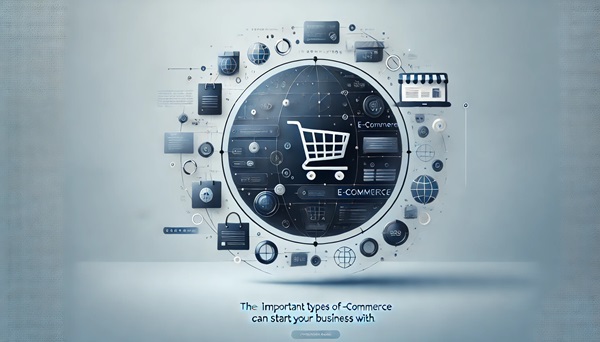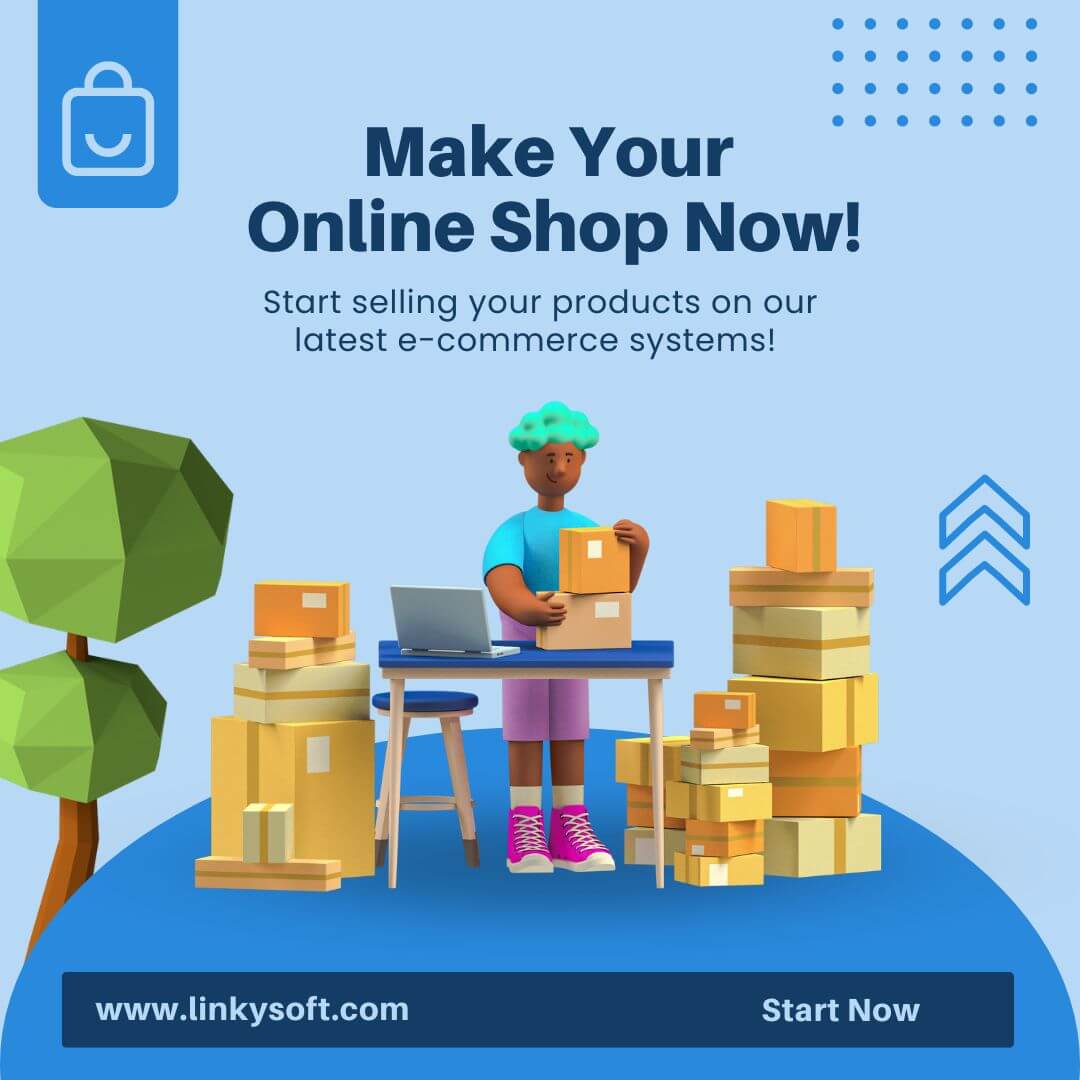In today's digital age, e-commerce has become a key driver of business growth worldwide. Entrepreneurs looking to capitalize on the booming online market can choose from various types of e-commerce models. Each model comes with its own advantages and unique challenges. Understanding these models in-depth is crucial to choosing the one that aligns with your business goals. This article will explore The Most Important Types Of E-Commerce You Can Start Your Business With, providing detailed insights into each model, including examples and the necessary tools to succeed. We’ll also introduce the Linkysoft e-commerce systems, which offer cutting-edge solutions to streamline your operations.

B2C (Business to Consumer) E-Commerce
One of the most popular and common types of e-commerce is Business to Consumer (B2C). This model involves businesses selling products or services directly to individual consumers. The B2C sector is massive, accounting for the majority of online retail transactions. Popular platforms such as Amazon and Shopify dominate the B2C landscape, enabling businesses to reach millions of customers globally.
Why Choose B2C E-Commerce?
B2C e-commerce is ideal for businesses looking to establish a direct connection with their customers. It provides various opportunities for customer engagement, brand building, and personalized marketing. Additionally, the B2C model offers a high potential for growth, especially as more consumers shift their purchasing habits online.
Benefits of B2C
- Direct interaction with customers, allowing for personalized marketing strategies.
- Wide customer reach, as businesses can sell globally without geographic limitations.
- Lower overhead costs compared to physical retail stores.
Examples of B2C E-Commerce
Some well-known examples of B2C businesses include online retailers like Amazon, fashion brands like Zara, and streaming services such as Netflix. These companies leverage the B2C model to provide products and services directly to end-users, allowing them to maintain control over the customer experience.
Linkysoft Solutions for B2C
To streamline your B2C operations, Linkysoft offers various e-commerce management systems like Cartz, designed to handle everything from inventory management to customer engagement.
B2B (Business to Business) E-Commerce
In the B2B (Business to Business) e-commerce model, transactions occur between businesses. This can include manufacturers selling to wholesalers or wholesalers selling to retailers. B2B e-commerce has grown significantly due to the increasing demand for digital solutions in the supply chain.
Why Choose B2B E-Commerce?
B2B e-commerce is often characterized by larger order quantities and recurring transactions. It's ideal for businesses involved in bulk trading, manufacturing, and professional services. Unlike B2C, the decision-making process in B2B tends to be longer, as multiple stakeholders are involved in the purchasing process.
Benefits of B2B
- Higher order values compared to B2C transactions.
- Opportunities for long-term business partnerships.
- Automation of procurement processes, reducing manual labor.
Examples of B2B E-Commerce
Platforms like Alibaba are prime examples of B2B e-commerce. Alibaba connects suppliers with businesses worldwide, facilitating bulk transactions across various industries. Other examples include companies selling specialized software or industrial equipment.
Linkysoft Solutions for B2B
Togar, a multi-vendor e-commerce management system from Linkysoft, is perfect for businesses looking to establish a B2B marketplace, offering advanced features such as vendor management and seamless bulk order processing.
C2C (Consumer to Consumer) E-Commerce
Consumer to Consumer (C2C) e-commerce refers to transactions between private individuals. Platforms such as eBay and Craigslist are well-known examples of C2C marketplaces, where individuals can sell items directly to other consumers.
Why Choose C2C E-Commerce?
The C2C model is perfect for startups and individuals looking to sell products without the need for a traditional business setup. It’s also great for second-hand or used goods markets. With lower overhead costs and flexible sales models, C2C offers a low-risk entry into the world of e-commerce.
Benefits of C2C
- Lower costs and easier entry into the market.
- Direct peer-to-peer interactions, enabling a sense of community.
- Flexible pricing and product offerings, as individuals can set their own terms.
Examples of C2C E-Commerce
Major players in the C2C space include eBay and Etsy, which enable individuals to sell products ranging from second-hand goods to unique handmade items.
Linkysoft Solutions for C2C
Linkysoft’s Togar Pro system is an excellent tool for managing multi-vendor C2C platforms, offering enhanced features for vendor collaboration, payment integration, and customer relationship management.
C2B (Consumer to Business) E-Commerce
Consumer to Business (C2B) e-commerce is a relatively unique model where individual consumers offer products or services to businesses. This model is often seen in freelance work, where individuals provide specialized services such as graphic design or content creation to companies.
Why Choose C2B E-Commerce?
C2B e-commerce is ideal for freelancers and professionals looking to sell their expertise to larger organizations. It offers flexibility for both consumers and businesses, as pricing and service offerings are often negotiable.
Benefits of C2B
- Freedom for individuals to offer services on their own terms.
- Lower overhead costs for businesses seeking specialized services.
- Ability to tap into a diverse pool of talent from around the world.
Examples of C2B E-Commerce
Platforms like Fiverr and Upwork are well-known examples of C2B e-commerce. These platforms allow freelancers to offer services such as graphic design, writing, and programming to businesses globally.
Linkysoft Solutions for C2B
For C2B-focused businesses, Linkysoft’s suite of e-commerce management systems offers flexibility in handling custom projects, customer management, and secure payment processes.
B2G (Business to Government) E-Commerce
Business to Government (B2G) e-commerce involves businesses selling products or services to government entities. This model typically requires strict compliance with government regulations and involves contracts or tenders issued by government bodies.
Why Choose B2G E-Commerce?
B2G e-commerce offers the potential for long-term, lucrative contracts. Governments often need large quantities of products or specialized services, providing steady revenue streams for businesses that can meet their requirements.
Benefits of B2G
- Stable and often high-value contracts with government agencies.
- Opportunities to build long-term relationships with public sector clients.
- Reputation enhancement for businesses that serve government entities.
Examples of B2G E-Commerce
B2G e-commerce examples include businesses that provide essential services such as IT infrastructure, public safety equipment, or healthcare products. Many of these transactions occur through government tendering platforms like SAM.gov, the U.S. government’s official procurement site.
Linkysoft Solutions for B2G
For businesses looking to enter the B2G market, Linkysoft’s e-commerce systems can help manage complex procurement processes, ensuring compliance and streamlining contracts.
D2C (Direct to Consumer) E-Commerce
Direct to Consumer (D2C) is an emerging trend in e-commerce where manufacturers sell products directly to end consumers, bypassing traditional retail channels. This model allows businesses to have full control over their brand, pricing, and customer interactions.
Why Choose D2C E-Commerce?
The D2C model is ideal for manufacturers looking to eliminate the middleman and build a direct relationship with their customers. This model also allows for better control over pricing, branding, and the customer experience.
Benefits of D2C
- Greater control over pricing and profit margins.
- Direct feedback from customers, helping improve products and services.
- Enhanced brand loyalty and customer retention.
Examples of D2C E-Commerce
Brands like Warby Parker and Casper are prime examples of D2C businesses, selling eyewear and mattresses directly to consumers, bypassing traditional retailers.
Linkysoft Solutions for D2C
Linkysoft’s e-commerce systems offer robust tools for D2C businesses, including customer engagement features, inventory management, and integrated payment systems.
Subscription-Based E-Commerce
Subscription-based e-commerce has gained popularity in recent years, with businesses offering products or services on a recurring basis. This model is widely used by software companies, streaming services, and even meal delivery businesses.
Why Choose Subscription-Based E-Commerce?
The subscription model provides businesses with a consistent revenue stream and builds long-term customer loyalty. It’s ideal for businesses offering consumable products or ongoing services that require regular delivery or access.
Benefits of Subscription-Based E-Commerce
- Predictable revenue through recurring payments.
- Enhanced customer retention and brand loyalty.
- Opportunities to upsell and cross-sell to existing customers.
Examples of Subscription-Based E-Commerce
Well-known subscription-based businesses include Netflix, which offers video streaming services, and Dollar Shave Club, which delivers grooming products on a subscription basis.
Linkysoft Solutions for Subscription-Based E-Commerce
For businesses interested in the subscription model, Linkysoft’s systems support recurring payments, automated billing, and customer relationship management tools.
Mobile Commerce (M-Commerce)
Mobile commerce, or m-commerce, refers to e-commerce transactions conducted through mobile devices. As smartphones become more ubiquitous, m-commerce has experienced tremendous growth, making it an essential part of modern e-commerce strategies.
Why Choose Mobile Commerce?
M-commerce offers businesses the opportunity to tap into the growing mobile user base. With features like mobile-optimized websites, apps, and one-click payments, businesses can provide a seamless shopping experience to customers on the go.
Benefits of Mobile Commerce
- Greater reach as more consumers use mobile devices to shop online.
- Faster checkout processes, leading to higher conversion rates.
- Opportunities to leverage mobile-specific features like push notifications and location-based marketing.
Examples of Mobile Commerce
Popular examples of m-commerce include mobile apps from brands like Amazon and Starbucks, which allow customers to make purchases and access loyalty programs directly from their smartphones.
Linkysoft Solutions for Mobile Commerce
Linkysoft’s e-commerce systems are fully optimized for mobile commerce, providing seamless integration with mobile apps and mobile-friendly websites, ensuring a smooth experience for your customers.
Conclusion
The e-commerce landscape offers a variety of business models, each catering to different needs and customer bases. Whether you’re starting a B2C, B2B, C2C, or another type of e-commerce business, understanding the nuances of each model is crucial for success. At Linkysoft, we provide a range of e-commerce management systems to help businesses navigate this complex world and maximize their potential.








